|
| 2015 | JAN | FEB | MAR | APR | MAY | JUNE | JULY | AUG | SEP | OCT | NOV | DEC |
| 2016 | JAN | FEB | MAR | APR | MAY | JUNE | JULY | AUG | SEP | OCT | NOV | DEC |
| 2017 | JAN | FEB | MAR | APR | MAY | JUNE | JULY | AUG | SEP | OCT | NOV | DEC |
| 2018 | JAN | FEB | MAR | APR | MAY | JUNE | JULY | AUG | SEP | OCT | NOV | DEC |
| 2019 | JAN | FEB | MAR | APR | MAY | JUNE | JULY | AUG | SEP | OCT | NOV | DEC |
| 2020 | JAN | FEB | MAR | APR | MAY | JUNE | JULY | AUG | SEP | OCT | NOV | DEC |
| 2021 | JAN | FEB | MAR | APR | MAY | JUNE | JULY | AUG | SEP | OCT | NOV | DEC |
| 2022 | JAN | FEB | MAR | APR | MAY | JUNE | JULY | AUG | SEP | OCT | NOV | DEC |
| 2023 | JAN | FEB | MAR | APR | MAY | JUNE | JULY | AUG | SEP | OCT | NOV | DEC |
![]() Read current month's Daily Reflections
Read current month's Daily Reflections
![]() Table of Contents: Daily Reflections
Table of Contents: Daily Reflections
![]() Youtube Channel: Video Listing
Youtube Channel: Video Listing

White (Dutch) clover, Trifolium repens.
(Photo: Janet Kalisz)
Reflections October 2023
After a hot summer we welcome October unfurling in an extravaganza of colors -- reds, yellows, rusts, crimsons, all against a background of residual green that fades as the month progresses towards the somewhat leafless November. October is majestic, fresh, and pleasant; it's wonderful in sight and smell. We await all October colors with anticipation: golden corn, orange pumpkin, scarlet maple, violet aster, shiny brown squirrel, green turnip tops and purple bottoms, buzzing yellow jackets, amber sorghum, and crystal running streams. We notice shorter days and stir ourselves to gather firewood, air winter clothes, service vehicles, add insulation, build cold frames, and pot herbs.
White Clover You crown the season with your blossoms, |

Early October blooms of Campanula americana.
(*photo credit)
October 1, 2023 Affirming or Denying Service
“Which of the two did his father’s will?” (Matt. 21:30)
Jesus speaks of two sons who were asked to go into the vineyard and work; one says “yes,” but doesn’t go and the other says “no,” but goes. Jesus asks who did the faither’s will and the answer from the listeners is the second. We are often the two sons wrapped into one person, for we sometimes affirm what needs be done but fail and sometimes deny and then regret and ultimately perform the service. We can focus on those to whom Jesus was speaking, or we can look into ourselves and find imperfect responses. In a blaze of good will we say we want to follow the Lord’s will and then comes other distractions; we may overlook the call of the Spirit, but then in a moment of grace perform the service.
Why personalize these periods of possible service? In part, it is because rendering the service stands out to us as an exercise of freedom denied the other earthly creatures; we are asked by the Lord but not forced to respond in a certain way. We have the space to affirm or deny what is sought and yet may ponder the benefits and risks involved, knowing the Lord sometimes calls for difficult but rewarding service. To follow Christ is to wash the feet of wayfarers – and that is not an easy task; and this washing is often quite distasteful.
In a moment of good will we want to do what the Lord seeks of us through the prompting of the Holy Spirit; we are moved with compassion for others – and affirm this calling. But our humanity enters all too often with attractions and allurements that can take their toll; we can forget those gracious opportunities and move on to other things that seem more fitting for the moment. This then is not a once only event, but crops up a number of times in the year. The Lord does not push us, but invites us to say “YES,” and in moments of grace hear the calling clearly; we discover doing so involves difficulties and yet ultimately brings peace of soul.
Often the service being offered has its hardships (working in the vineyard is sweaty) and so an excuse is sought. We need to pause, to reflect, to avoid being impulsive. Taking time to decide is well spent and worth a prayerful moment. The quick denial that lacks depth can be countered by the quick affirmative that makes one have second thoughts. However, if we are generally on the right track, we will listen to second thoughts. The wise one seeks to pause and reflect, hopefully within a prayerful atmosphere; the impulsive one can move too quickly and then launch out into the deep on one’s own hasty judgment. However, when consistently giving the Lord loyal service, good decisions can come more naturally though experience that includes recognition of past failure and success. The right decision is more frequently “yes” with foreseen possible difficulties. Such is life!
Accompanying Dying Animals
By Fr. Al Fritsch, SJ
My local veterinarian Linda told me recently that she sat up all night with a dying mule. I found this to be extremely unusual, and asked “You mean you actually sat with an animal that was dying?” She answered, “Yes, because it’s important for someone to be present when an animal dies.” She resides at a horse retirement farm and therefore she knows each of her animals very well, and she felt that the mule needed her present as it passed on from this world. When I asked around, many people were aware of this practice, especially with pets when they approach their end, feeling that animals deserve deep compassion and care through their deaths.
Understanding our beliefs is an essential step into making decisions regarding our animals. From a Christian viewpoint (and other religious views as well), we should show compassion and companionship when someone is dying, so that they do not die alone. Christianity calls for the spiritual exercise of actually being with people as they are dying, praying with them and helping them through to the next life. That certainly applies to human beings, but what about animals and plants? Do we believe that they have a new life or not, and do they deserve to have someone there when they’re passing? Any death offers a great opportunity to try and connect with our beliefs.
At what stage in the whole chain of the animal and plant world do we consider this compassion necessary? Perhaps we feel it for a mule, but what about for a Mayfly? We don’t often think of accompanying death in those terms. In Christianity, we know that Christ ate fish and lamb; something had to die in order for people to live, and butchery - the preparation of meat for human consumption, was commonplace in the world and will likely continue so. Some cultures, such as Native Americans and others, will actually ask God’s (or the animal’s) forgiveness as they kill them, thanking them for their sacrifice so that others might live. Here there is a particular sensitivity to the animal.
Almost all cultures do not like to see animal’s suffer or be tortured in any way. When I was growing up on a farm, to kill a hog meant that you didn’t allow it to squeal. You had to shoot it with the 22 rifle, in an area the size of a dime between the nose and eyes. It had to be hit precisely, so that the animal would fall over immediately with no squeal and no pain. We did the butchering in such a way that the animal itself was least affected. In a previous essay we spoke about cultivating meat in a lab from animal cells, thus moving from resource-intensive animal products to plant-based ones with many added benefits. This is a hugh contrast to what we did when I was young.
As I mentioned, we killed our own hogs, but we also had a lot of chickens, some for the pot. The kids would bring my mother the chickens one by one, and she would quickly cut the heads off and let them run around until their energy ran down. We once had a visitor come at that very moment, and he was amazed when he saw this yard filled with headless chickens. We thought his astounded face was the funniest thing in the world, and would laugh about it for years to come. But you know it lost its humor over time.
I think that’s what I’m talking about with Linda sitting up all night with her mule. We should cultivate a deeper respect for animals than we had in the past, or with the gigantic meat consumption industry we have today. Many people who eat meat have never seen animals killed, and if they did they may give it up altogether. Sensitivity to this leads us in a direction where we will not easily sacrifice animals for our meat addiction, and to the knowledge that we don’t necessarily need it. With 150 companies working right now on making cultivated meat without killing animals, we should look back on the crude methods of the past and support new ways of thinking. I’m talking about a single person changing their relation to meat consumption and meat presence in their own life. Examine how you feel about this, and how we as ecologists can keep our resource-use at the lowest possible level. Can we do this and at the same time show deep and lively respect for the animals in our life? I ask this question sincerely, and your answer is important.
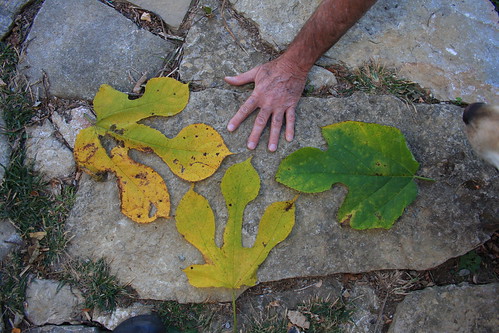
Together, in the web of life.
(*photo credit)
October 2, 2023 Knowing and Championing Sanctuary
One meaning of "sanctuary" is a place of refuge, protection or asylum where, in the ancient tradition of Christendom, fugitives were immune from arrest in churches or other sacred places. With the continued specter of deportation of undocumented workers, sanctuary has in recent times become a real necessity. Will the English "common laws" that were transferred to our legal system in the United States be tested, for sanctuary was part of England's history in medieval times? Today, some church leaders announce that their church workers should defend the undocumented and not cooperate with legal authorities in crackdowns leading to deportation. Is sanctuary today a real possibility?
This raises pastoral questions for many of us who know workers who fit the category of undocumented or "undesirable." Should we conform to a system that could be quite unjust toward innocent and hard-working migrants? We must speak out against illegal profiling that challenges the presence of these people of one or other racial or ethnic group. We may raise a hornet's nest of differences within congregations by offering "sanctuary" for the ones who are targeted. Furthermore, we may have to call for a review of "sanctuary" requirements of the past that in some circumstances included excommunicating the law enforcer who dared to enter sacred space to seize and prosecute the fugitive.
This is more than academic, since people are subject to such deportation by current law enforcement practices. Theoretical "sanctuary" is easier than in practice. Who feeds the refugees who seek sanctuary? How long will they stay? How can they function as citizens when they have no rights? What about medical access? Who is to obtain legal assistance for them? Isn't this a temporary measure at best, for the asylum must continue to function in its customary role?
Sanctuary is a practice worth restoring in lands where imprisonment awaits the conscientious objector from military service. A neighboring nation that offers sanctuary is one outlet (Canada offered sanctuary to Americans during the Vietnam War). What seems so radical on the theoretical level could become a nightmare on the local level like "our parish." If publicity becomes an educational tool for correcting unjust deportation practices, a local sanctuary is highly justified and of pedagogical importance. If legal authorities refrain from nabbing the asylum seeker, but keep an eye open to when the refugee leaves the grounds, then the sanctuary has little lasting impact. The conclusion is to retain the practice of sanctuary as a teaching tool; discourage it as a long-term solution to the illegal immigrant problem; and work for immigration reform. Petition for action and confront your congressperson on the issue of reform. But at least keep open the possibility of sanctuary in our age.
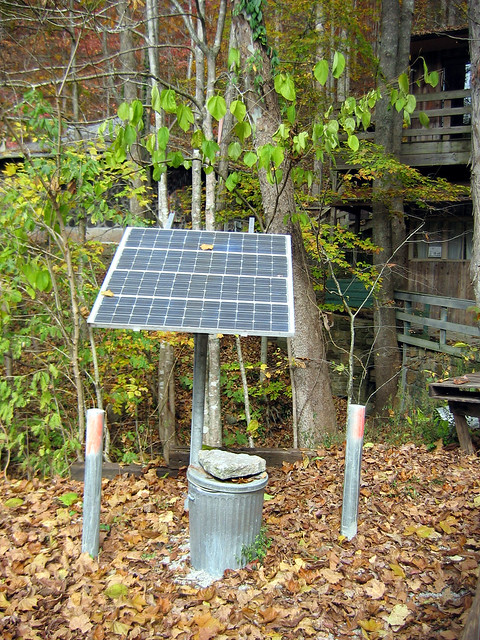
Use of solar energy is abundant at the Mary E. Fritsch Nature Center, Appalachia - Science in the Public Interest.
(*photo credit)
October 3, 2023 Promoting Solar Energy: A Renewable Alternative
During October groups throughout the country sponsor solar tours to promote this renewable source of energy; it is decentralized, environmentally benign, and a good alternative to fossil fuels that cause climate change. A quick website search will tell you the tour nearest to where you live -- and these opportunities are becoming more frequent as solar equipment becomes more affordable. The tours include a wide variety of solar applications: passive solar buildings, photovoltaic (PV) panels, solar greenhouses, solar-powered vehicles, solar hot water systems, and solar lighting. With expensive fuel bills even amid plentiful natural gas, solar investment has a reasonable payback, especially with increasing state and Federal incentive programs.
My book with Paul Gallimore, Healing Appalachia: Sustainable Living through Appropriate Technology includes a host of proven solar applications, along with details and references for a number of other appropriate technologies. It is time that all of us think simple lifestyle and champion appropriate technology, since solar panels and other equipment are declining rapidly in price after several decades at relatively high prices. Commercial businesses are joining the band wagon and furnishing roofs with solar panels and other applications. Even with declining prices solar is still second to wind in total renewable energy application, but the potential is strong to match lower prices and become attractive to a wider range of population.
A whole range of changes usher in the solar age:
* Solar shingles as alternatives to free-standing PV panels are undergoing noticeable improvements in technology and prices;
* More states are incorporating friendly policies to feed solar produced energy at homes back into the grid system;
* States like California give generous incentives for new housing construction with solar applications, as well as promoting utility installment of domestic solar units on private homes;
* Solar hot water systems are becoming more popular, especially in the South as a low-priced solar application;
* Solar cars have far lighter and longer-range batteries than just a decade ago, and bypass high auto fuel costs; and
* Solar recharging stations are being installed in certain businesses so that solar electric cars with limited ranges can be recharged while employees or customers are occupied.
Solar energy applications have come a long way since 1978, when we at ASPI built the first "solar house" in Rockcastle County, Kentucky. Today, thousands of new and older homes a week are now being solar fitted in a wide range of states in our country, though California is up front. While some areas are more solar friendly, still solar will soon pay for itself in virtually all parts of our country and even northern New Jersey and a number of Midwestern states are taking a lead.
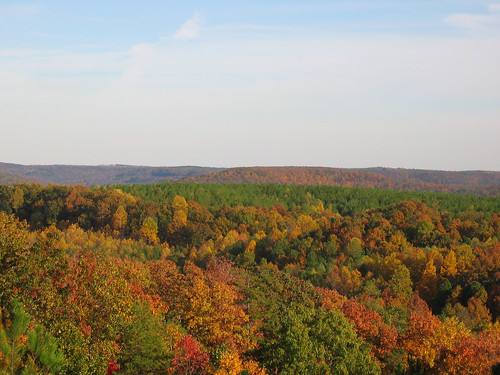
Prepare for the emergence of autumn color!
(*photo credit)
October 4, 2023 Extending Francis' Blessings
On this feast of St. Francis, the patron of ecology, we may bless animals and discuss Francis' contributions to the love of Earth and all creatures. In doing both we extend the realm of blessings to all aspects of creation as a fitting tribute to Francis and his spirit. On the other end of the spectrum, we know and hear curses rendered to everyone and everything, and we see that the destruction of the Earth is a type of curse expressed in deed. Curses must be overcome with universal blessings.
Bless the Earth that gives us life --
our womb and tomb,
our secure surroundings,
our color and strength.
Bless the heavens --
the vital sun that gives us light and warmth,
the gentle moon that softens the night,
the stars that show us direction and grandeur.
Bless the waters --
slaking our thirst,
cleansing away the grime,
flowing, sparkling, and gurgling in delight.
Bless the air --
that flows past us,
that allows us to breathe,
that dilutes the pollution.
Bless the fire --
we need to heat our homes,
to cook our meals,
to boil our water.
Bless the plants and fruits --
that brighten the surroundings,
that furnish us food,
that yield good scents and flavors.
Bless the animals --
always giving us comfort and affection,
never failing to guard us well,
always being at our service.
Bless the people in our lives --
relatives and loved ones,
companions and friends,
strangers willing to help in need.
Bless the angels of heaven --
who protect us from harm,
who watch over each of us,
who stand before the throne of the Almighty.
Bless our God --
Should we presume to bless the Giver?
Should we bless or simply receive the Gift?
Should we dispense blessing to the act of Giving?

Butterfly milkweed, Asclepias tuberosa.
(*photo credit)
October 5, 2023 Treating Miracles, Prayers, and Community Growth
There are two ways to live your life.
One is as though nothing is a miracle.
The other is as though everything is a miracle.
Albert Einstein (1879-1955)
We don't expect miracles, or do we? Perhaps our problem is that we do not see miracles in the work that we do. Personal attitudes with respect to the mystery around us are one answer to a rapidly secularizing world, especially when we discover that our existence as individuals and as communities has a certain miraculous character. This is a divine communal gift.
Such seeing of a prevailing miracle deserves not only private prayer but prayer of the Church throughout the world or in formal settings with a number of people (e.g., a Liturgy, prayer service or choir). When it comes to communal work, the community's prayer is the glue holding things together. We cannot sit back as mere observers and expect God to work miracles. Through faith we believe in the miracle of working together. Yes, Einstein is right that everything is a miracle. Christians believe that the movement of all things back to God through Christ is part of that grand miracle of salvation history. We are miracle workers with Christ who told us to expect greater acts beyond his wonderworking.
Believing in miracle-working is more than wishful dreams; we are called through faith to help bring about miracles of grace. This is not a condition that says "goodbye" and "good luck." Instead, we vow through our baptism to work as faithful people and to share with others. We know with enough faith mountains can be moved and so we work to collectively halt the climate change conditions now coming in our world -- the mountains of despair. We realize that it is difficult to work in communal undertakings, because of self-interest on the part of spoilers who can paralyze cooperative efforts. This is where and when we turn to God and seek the calming of storms through prayers for courage and perseverance. We survive in a small, sometimes turbulent lifeboat together where we must save our Earth as one community.
Despair and powerlessness are overcome in the hope of the risen Lord. Gathering together we find courage in the prayer of the worshiping body in community or choir or privately, but also in communion with all the faithful in the world. In this joined prayer, God's presence becomes more apparent in our faith-filled actions. Communal prayer life is an integral part of our whole life, a growth in maturity and proximity to God through a godly Earthhealing enterprise. This union within a faith-filled community harkens back to enthusiasm as the criterion for both individual and communal action. Maintaining enthusiasm is a challenge, and thus while miraculous it demands continued effort on our part.

Cardinalis cardinalis, Northern cardinal.
(*Photo by Sally Ramsdell)
October 6, 2023 Remembering Autumn's Dangers
I go out and hear birds congregating
all chirping wildly at the same time,
'winter is coming -- maybe so, maybe so.'
How else to interrupt their animated chatter?
They fly within the leafed tree in a flutter;
just as abruptly they depart for another place;
Is it the intuition of impending seasonal change,
or induced excitement of sheer number?
When they pass over in such number,
I shield my eyes for fear
their dropping might miss the good Earth
and hit me right between my eyes.
Prayer: Lord, remind us to remember the birds, reminders of your seasonal changes.

A "sundog" in crisp, October sky.
(*photo credit)
October 7, 2023 Distinguishing Secular and Spiritual Empowerment
Few of the 3,200 reflections on this website may be regarded as involving some uncertainty on how components are related; however, this is one of them. Certainly, empowerment does occur on both physical and spiritual levels, but how are these similar and how different? Can those without a sense of spirituality become empowered, or is there a perverse spirituality at the root of this physical phenomenon? The world has had many "powerful" people, some acting for good and some for naught.
Diabolic power? Those who read the Scriptures find ample references to the power of the evil one at work -- and Jesus directly contends with that power on numerous occasions. Today, many believers in God would say little about a devil or personified evil in our world. Is part of the power of personified evil that it succeeds in denying its own existence and even convinces us this is a good worth touting? Does atheism have its own perversity, as well as the absence of personified evil? Does this reflection on our enticing consumer culture (observed for over five decades) bring a conclusion that diabolic activity penetrates our current economic system without our admitting it?
Secular empowerment -- Is poverty as combination of paucity in resources and hopelessness the seedbed of secular empowerment? Community and political organizing in the Saul Alinsky model, as later applied to registering voters with few resources, is empowerment. So is the Trump ex-presidential operations with his devotees and its violent threats of possible radical extremism. Empowerment comes to the disorganized when perceiving power in organized numbers. Groups are energized by acknowledging the need to overcome their own weaknesses. Petitioning legislators about certain issues on Move-on.org is community organizing at a national level, a nod towards participatory democracy. Internet-transmitted petitions can be gathered in large numbers and the increased volume delivered to decision-makers – are all of these forms of empowerment at work?
Spiritual empowerment begins with an experience of individual powerlessness before God, or through humble acknowledgement of lack of essentials of life, our impoverishing alluring escapes, or our current condition of angst. Often when communities are damaged, social capital erodes and this becomes a community form of spiritual impoverishment. When affluence erodes civility and mammon replaces godly practice, the failure to act shows social impoverishment. Awareness of lack of power can become moments of grace. We cannot pull ourselves out of the mud by our bootstraps; we need the help of God, in whom we trust. Without divine assistance, the forms of secular empowerment do not work successfully. Allowing persistent physical or psychological poverty to continue to exist impoverishes our world through a paralysis brought on by lack of faith. Calling to God for help is spiritual empowerment, and needed in healing our wounded Earth.
 a8
a8
The People's Climate March.
October 8, 2023 Caring for Earth, God's Vineyard
My friend had a vineyard on a fertile hillside. He dug the soil, cleared
it of stones, and planted choice vines in it. (Isaiah 5:1-2)
The Scripture texts for today tell of a vineyard of the Lord and in the Gospel (Matthew 21:33-43) how it was mistreated by ungrateful tenants. We are able to extend the vineyard to our entire Earth and see God's great care in giving us this rich planet with air, oceans, mountains, trees, and fertile land. In some ways this Earth was prepared for us over billions of years -- a period of immense care that is a marvel to behold. However, the realism of lack of care by those who are vineyard keepers strikes us both by the Old and New Testament readings. We have mistreated the gift given through lack of gratitude and greed.
Vineyards are beautiful to behold. I recall the care taken in the Route des Vins d'Alsace in France; the vines are so carefully pruned and filled with grapes at this time of year, all with a goal of fine wines, which many will appreciate. Here in Kentucky, I try to care for my own vines in the back of the Rectory, and realize that it takes effort to keep them trimmed and ready for the harvest. The spring's new shoots have a certain beauty as do the summer's vines and green clusters, which start the long ripening process. Harvest time involves work8 but is also sheer joy when bringing in the fruit of the vine. Harvesting is a time of song and gratitude for all good things to which we are called to participate. We extend our gratitude to this awesome planet in all its laden beauty.
While marveling in the gift of this vineyard, we become all the more aware that we must do more. Some through greed or carelessness damage the vineyard by wasteful actions and careless habits; monetary profits are their only guiding light. The careless grab the vineyard as though it is their personal possession and even ignore and harm those who come to receive the produce in the name of the Lord of the vineyard. We are invited into the process of enjoying the products of the vineyard and to preserve the vineyard for those who are to come after us. The careless allow the vineyard to yield for their own greed, without being mindful that they are here but a short time and must share.
This brings us to the dual role we play as vineyard keepers; we marvel at the productive process of growth and final wine of good taste; we act as protector of vineyards that form a community with neighbors and must see that all the vineyards are kept in good shape, for the future is a community concern -- tending and protecting. Gratitude for what we have is not just shown in words of praise; this is extended in the protective act we give through civic responsibility to see that the careless and greedy ones do not have the last word. Vines are of social concern and need proper tending and neighborly protection.
Mobility
By Fr. Al Fritsch, SJ
Mobility is part of nearly everything in our lives. As infants we love to crawl, shuffle and stretch ourselves to move about; as young people, we scramble around, run, jump, and skip; as adults it’s how we stay connected with the people and places important to us. We hate to see these activities curtailed in any way, yet this happens progressively as we age. Older people, who well remember how they moved when young or in middle age, are simply slowing down and that means less mobility.
I understand this very much because even a year ago, I still had my license and was able to drive, but I think it would risky to try that today. I’ve had to cut back my activities, like gardening and cooking and a lot of other things I did on my own just a year ago. Things have changed for me today and when I see able-bodied people moving about very swiftly, it really strikes me how much that mobility is a gift from God. When this mobility is beyond us, we truly know its value.
Now the walker I use begins to look pretty good. It allows me semi-independence in the sense that I can go and eat on my own, I can worship and move about to visit or do various activities, even go to the nurses’ station. Some can’t do that, as one quarter of our retirement community here are in wheelchairs and some of those need help each morning with basic things, mostly because their mobility is deeply restricted. When I reflect more deeply I see that we are who we are in part because mobility equals freedom. We are pilgrim people, migrant people, people who are on the move for change, who have worked and walked and run to improve our quality of life. So we can look back on all the times that we traveled and what we learned, and in general thank God for those opportunities to explore the world around us.
On a personal level we can look for ways to assist others who have limited mobility and improve our own. If we have a physical issue we can access therapy to regain balance or improve endurance and to practice using mobility devices. We can help others to stay active and simplify basic daily tasks, and identify safe routes in the home or in public areas. I’m always afraid of falling, as are many older folks, and for that reason we use walking sticks and walkers and rollators for assistance in holding ourselves up. It also helps to have outside assistance from time to time, but it’s always empowering to do things ourselves.
We should encourage others to be on the lookout for those who are incapacitated in some way and open up opportunities for them, even open doors. Show them how to live a more healthy life and be sensitive to mobility. Everybody moves if they’re alive, while blood is moving through the veins, so in that sense we are all in motion, just to different degrees. We should try to maximize our mobility when we can, and if we can’t, understand and actually thank God for those times when we could. It’s a sense of our freedom that we protect and guard as best we can, and that is something well worth encouragement for self and for others.
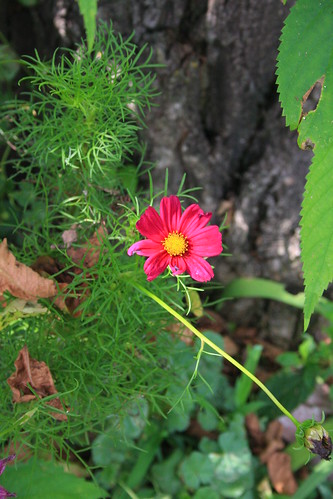
Cosmos blooming in rural Kentucky garden.
(*photo credit)
October 9, 2023 Being Enslaved by Domestic Credit and Debt
For years these reflections cast alarms about domestic credit and then came the Great Recession -- and those cautions proved true. Unfortunately, the CEOs of institutions "too big to fail" did not learn the lesson, and so we are back again with an unsustainable System calling for a "healthy" expanding consumer credit -- and debt load. With each year, indebtedness from health and education expenses and lodging costs are overwhelming low- and middle-class folks, much less those saddled with home mortgages and auto payments. Indebted college graduates (with at least $30,000 debt) have postponed marriage and home purchase. All the while, our national debt continues to climb (though at a slower rate) and can only be relieved with a major tax reform and fair taxes on the wealthy.
A home, nation, or world living on credit is not healthy. I once asked a founder of an emerging non-profit organization how the project would be financed and he replied, "I have a credit card." He soon found out that this was not sufficient when payments came due. Furthermore, simply lowering loan rates does not solve the basic problem of debt "enslavement" of many to the current economic System -- and with nowhere to escape. The world has the rhythm of ups and downs in its economic systems and we hear credit promoters come out strong again during this Indian summer of improved employment. When millions of Americans lost homes, the government's attention was on saving threatened banks and industries. Many learn hard monetary lessons, but people soon become forgetful. The refinancing that allowed those with inflated home values to be tempted to credit is at work again. History does (in part) repeat itself.
American history is fraught with indebtedness, from founding fathers George Washington and Thomas Jefferson to Civil War victims, and to 1920's auto loans. Our history has a down side that includes recessions, depressions, and days of reckoning. What people are doing today is to get credit when times improve and a rainy day seems far away. A new credit binge is expected to fuel an economy that is unsustainable; it takes from the commons without being charged and thus becomes part of a credit system. Is it proper to borrow from the future because the borrower may not be around when payback is due? Credit fuels the System. While the pay-down on debt (including interest) approaches one-fifth of total disposable income, people are still willing to embrace credit and again start to spend thoughtlessly.
No one should base domestic or national livelihood on a gamble that good times are coming. Unfortunately, a growing gambling mentality extends beyond personal and national finances; they become global ones and enter into the way we see our moral responsibilities, our use of natural resources, our stance in the world, and our respect for the environment. Irresponsibility erodes our moral bearings. Living on credit verges on presumption -- that God will rescue us, no matter how badly we act.

Brickellia eupatorioides, Kentucky native autumn-blooming plant.
(*photo credit)
October 10, 2023 Connecting Environmentalism and Church Life
How can churches individually or collectively be beneficial in healing our wounded Earth? A number of ways come to mind:
Model in environmental action -- Church institutions and agencies may practice what is preached by respecting God's gifts of limited and fragile resources through refraining from purchasing, by recycling, by reuse, and by maintaining only energy-efficient vehicles and buildings. Efficient lighting fixtures can be installed and use restricted to times of need.
Educational source -- Churches can sponsor services, bulletins, and Internet outlets and programs that teach a conservationist ethic based on a proper understanding of moral demands in caring for our Earth. Greed and waste are challenged by every religious tradition, and selfless care and, in turn, proper respect are proclaimed by them. Curbing waste can be a church project and a positive way of teaching members through deed.
Source of encouragement -- Church life can be encouraging in ways of showing God's gifts through services, prayers, sacraments, and all liturgical functions in such a way that believers are inspired and discover the ever-deepening mystery of God in their own lives. Dire warnings of climate change can be matched by confidence in working together to make positive changes.
Inspiration to the disabled -- Many people are unable to do active work but their prayers and suffering offered for the cause of Earthhealing can benefit all. This can be done in unison with all who are doing active work as a total body at work and in reparation for the damages done in the past and present.
Radical sharing -- The universality of the Church can work towards Earthhealing by emphasizing that all as brothers and sisters and that excess must be shared with the destitute. This is most necessary in times of natural and human-made emergencies; however, longer-range development projects are very important for the fruits of the commons rightly belong to all.
Model of cooperative activity -- Churches are able by working together on common projects to manifest to the world a model of what the broader society could do. Earthhealing must be a global project and every cooperative effort feeds into a global unity.
Subsidiarity -- Decisions are to be made at the lowest level that can give a proper result while acknowledging at the same time that higher levels are necessary for the entire success. Much can be done at the lower community level as "church," but not all; we need the interconnections with higher levels of governance and the environmental is certainly where all levels must be in harmony.

Sun-ripened berries of the pokeweed, Phytolacca americana.
(*photo credit)
October 11, 2023 Questioning Our Sense of Respect
Has respect eroded in this age or is that an aging person's perspective? Do we only imagine that there is less respect exercised today? Instead of quibbling about comparative history, how about emphasizing ways of showing deeper respect? Is the following checklist complete for showing one's place in current respectful practice?
* Do I thank people for generous service, even when I am not expected to do so at a checkout counter or on receiving a message?
* Do I dress properly for a special occasion, or am I informal when the people at such major events as funerals or weddings want me to be slightly better attired?
* Do I show proper respect when visiting a place of worship, either of my own faith or of another's?
* Do I shake hands and try to learn a stranger's name?
* Do I speak respectfully on the phone (commercial solicitation may be an exception, especially a robo-message)?
* Do I show courtesy on the highway and allow another to enter when I am slowing down or halted at a stoplight?
* Do I hold the door open for others, especially those with little children or in a physically-challenged condition?
* Do I show patience at an airline counter or when standing in a line of any sort? Isn't this the pitfall for many?
* Do I tip generously or at least a little?
* Do I show indignation when courtesy is called for?
* Do I greet people at least with a smile?
* Do I stop and show respect when a funeral procession is going by on the highway -- a beautiful tradition worth continuing?
* Do I pause when the National Anthem is played?
* Do I maintain silence when asked to do so or speak softly, especially if talking on a cell phone next to another?
* Do I seek to protect wildlife when I have an opportunity, or do I do what many drivers are tempted to do -- run over snakes?
* Do I stop and help a visitor who is genuinely puzzled?
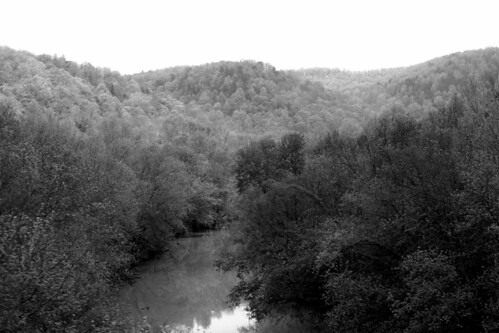
The Rockcastle River, near Livingston, KY.
(*photo credit)
October 12, 2023 Having Teresa of Avila as Model
It is time to give more attention to the great women of old who had to endure a male-oriented society and still found ways to be highly successful. One such is St. Teresa of Avila (1515 - 82) whose feast is her date of death. Note: On the day after Teresa's death (October 4, 1582, by the Julian calendar) the Gregorian reform of the calendar actually occurred, and thus ten days were dropped for correction, making her feast the 15th.
Teresa founded the Discalced ("barefoot") Carmelites and wrote profoundly about her spiritual experiences. Her works included: The Way to Perfection, Meditation on the Song of Songs, and her best known, The Interior Castle. She struggled mightily to get her world view accepted -- and her hard work, practical skills, and deep devotion paid off in the long run. Teresa is one of the first two women (also Catherine of Siena) to be declared a "Doctor of the Church" in 1970. Teresa came from an aristocratic background and entered a convent that had residents who were often wealthy and living on endowments, making "religious" life something soft and cushy. Their social life was not really removed from the world around them. Teresa's disapproval mounted during her two decades of unreformed Carmelite life. In 1554, while praying before the crucifix, Teresa underwent a profound conversion and concluded that she could not bear to be rich. For several years Teresa experienced a difficult period of misunderstanding and even persecution, but by 1562 had broken away with 15 other sisters and founded a reformed convent.
One of Teresa's insights was that the convent could be supported by "insecure" alms and work of the nuns, and not by endowments brought to the convent by individual wealthy women. This was a leap of faith that God would provide. The question was how can culturally highly dependent women with limited opportunities live out their lives without a certain fixed investment and income? For Teresa and her companions, the casting of themselves before God even for their very livelihood was a sign of wanting to be close to the poor Jesus. Teresa broke definitively with a comfort-laden Renaissance world of upper-class 16th century Europeans. She had the courage and charism to draw others to agree to be countercultural in lifestyle.
Teresa was a forerunner of those drawn to live a life with uncertainties that accompany billions of people in the world who do not have their livelihood assured or food source secure. Her motivation of radical trust in God and a spirit of poverty prevailed and grew with time to influence other groups as well. She challenged the concept that the providers of comfort for those in religious life are doing favors for the ones who live such lives. Through her experience from within the unreformed convent Teresa realized that over-comfort hurts religious fervor. In its place Teresa dared to be countercultural.

Mistflower, Conoclinium coelestinum, with soldier beetles, Cantharidae.
(*photo credit)
October 13, 2023 Choosing Wisely: Good Money, Bad Money
On Modern Mythology Day it is worthwhile to consider the apparent contradictory myths that "all money is bad money" and "all money is good money." Some hold the two simultaneously and so become indifferent as to any distinction of money sources or limited amounts that they receive. I prefer to distinguish sources and realize that ultimate results are linked to initial choices. Some money is just simply stained or tainted and must be refused. Granted, those with lax ethical standards may see no difference between "good" and "bad" money; they are convinced they can make bad money good in their creative ways, and that their good ends justify any source. However, there are degrees of being tainted and this becomes a problem causing good people to pause.
Argument one: It's all in the end use. Some say everything depends on how the money will be used and thus we can take any money. Really? I guess such gullible money-takers consider that stolen money could be used for charitable purposes -- and that makes it acceptable. Stolen money used by closing eyes to source makes one party to the theft. An exception may be the thief's inability to give the property back and so it could be accepted for charity; that may be acceptable, but rarely. Stolen money does not become "good" money because of beneficial end uses. When the resource is from the commons, it must be redistributed justly to those in need, and this is more than an individual's discretion.
Argument two: No one else knows the source, so who cares? Like all bad rumors, money sources become known since there are many people who are on the lookout for scandal of any sort, and funding sources are good candidates for investigation. For the agent responsible for a charitable enterprise, the tainted sources must be avoided lest the credibility of the institution or agency be at stake. And besides, it is wrong to accept just any money. The fact that the receiving group abides by ethical principles and has the freedom to refuse tainted money is salutary.
Argument three: Don't ask, just take. In this way of thinking it appears that ignorance is bliss. This sounds more respectable than the second where the taker knows or highly suspects sources. We are not certain of every dollar's source but that is not the point here. Sizeable donations to non-profits should be traced to the source due to reporting obligations. Thus, not knowing a source could be a sign of irresponsibility and lack of ethical integrity. Some think public interest groups are crazy for not accepting corporate money -- but, though in the minority, this refusal is the right thing, especially if one must be critical of such funding sources. Taking government (taxpayer) money is sometimes problematic. Government agencies vary as to expectations of how funds are to be used, and thus I have taken some government money in the past from specific agencies.
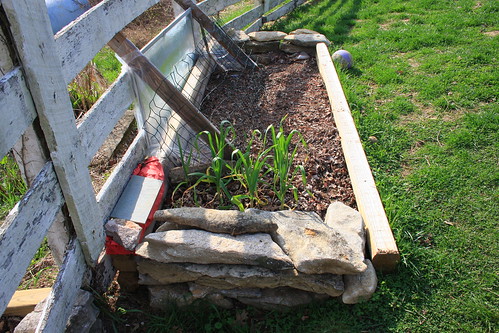
Growing onions in autumn.
(*photo credit)
October 14, 2023 Considering Small-Space Gardening
Many prospective gardeners are confined by space restrictions, but space is somewhat a relative term -- from acres to a few pots on a stoop at an entrance. Those with broader visions of space continue to grow corn and sunflowers that take extensive space. For others, do not let the abundant space folks intimidate you. Pots and small containers take less tending time and can be extremely productive if you are resourceful.
Potted mint beverages hold a special place in my garden economy notebook because they can replace imported beverages that cut heavily into limited food budgets. You may want a little of several varieties (I grow apple mint, spearmint, KY mint, pineapple mint, chocolate mint and peppermint) and when properly utilized these can be great money savers. The pots can be easily moved about to maximize outdoor growing time in summer (on decks or porches) and be indoors greenery in the upcoming winter season. Besides mint I grow oregano, parsley, dill, garlic, and cilantro (coriander), all of which are prized as spices for cooking as well as excellent small space herbs.
Greens are the second-best economy because so much of this costly produce can grow on so little space.
Furthermore, these plants can leaf out over container rims to make for even more growing space. Collards, lettuce, endive, arugula, spinach, kale, mustard, and others can grow well in small space and be grown as annual second and third crops, if atmospheric controls (indoors in colder time or use of cold frames) are used. Remember that some food poisoning is often attached to imported fresh greens and that prices on these in winter are beyond an average person's budget. Greens grow fast and have a bundle of nutrition in every bite, as well as being good weight-control diet choices.
Tomatoes are the desire of many who want to grow something in a small space and that wish is honored. People are proud of their growing finesse when ripe tomatoes appear and are relished as one's handiwork. Tomatoes are late in the diets of human beings because well into the 19th century some thought them poisonous, as are all parts of the plant but the fruit. Well cultivated and watered, a tomato plant can bear many pounds of produce and supplement the limited budget quite well with packed nutrition.
Stacked gardening is not within my personal experience, but only observation. My own economy of space has never been that severe. Potatoes are successfully grown in layers by adding a stacked tire to a previous one as the potato sprouts come through the surface of the dirt filled tire interior; another is added with additional fill material in turn. Each tire has a set of potatoes at the end of the growing period. Other stacking is done in pyramids with berries and radishes, etc., with literature abounding on how this is done as well as hanging pots of herbs. Ingenuity mounts if the will is to grow your own. Be creative.

Last of summer asters.
(*photo credit)
October 15, 2023 Embracing Mystery and Restlessness
You anoint my head with oil; my cup overflows. Psalm 23
On Columbus Day we recall a Europe that was not aware of the "New World." We wonder what it was like on the Nina, Pinta and the Santa Maria as Columbus' crew journeyed across the mysterious Atlantic seeking that shorter route to the Indies for the Spanish crown. For that matter, we wonder about all voyagers into the unknown, especially those who on the way to the Orient took the risky Portuguese route around Africa. All adventurers and the rest as well are on that restless journey of faith. We are all drawn by Mystery and yet we are tempted to insert other causes, names, idols, and crusades in our inability to reach and touch absolute "Mystery." Reaching out for the divine is who we are.
Mystery as magnet. Why do we continue to search? It is because, as St. Augustine says, we cannot rest until we rest in God. For sure we are being drawn by something or someone. Accepting Mystery is comforting in one sense: we have a motivation for our restlessness; this gives us encouragement, direction, and meaning in life. With maturity we come to realize that our journey is not one of conquest but one of surrender to the God who calls us. We can only have glimpses from the distance through divine revelation of Who God is. And even here our heart must accept being drawn to embrace Another Whom we cannot see.
Mystery as atmosphere. Much of our affluent age is one of haughty arrogance. People think they can create a world in which they are in charge -- and apart from any reference to Another. On the other hand, a sense of Mystery is an atmosphere in which one breathes the fresh air of freedom, not to do whatever one wants, but to be ever closer to a loving God and free to chart a course with the Almighty at the helm. To do what one wants is to make oneself into a lifeless idol of self and its utter confusion. On the other hand, to be open expands the horizon to the life-giving God of love, an anticipation to reach towards the Infinite. Claustrophobia gives way to healthy air, breath-taking, or better, breath-giving love. Our entry into Mystery is Spirit-filled, for we become immersed in Love energizing our onward quest.
Mystery as heart. Mystery is not agnostic. Even admitting that we cannot penetrate Mystery does not diminish our quest for knowledge as revealed, or our eternal journey of knowing and loving. Progress can be realized, but we still are not perfectly satisfied. We have not reached Mystery yet our heart prompts us onward to an unknown, but with the certitude of faith in a realizable goal. The prophet Ezekiel speaks of conversion of heart. Our path to Mystery is a journey of heart with its indicators: mercy, not sacrifice, hearts on fire and not of stone, and service to others not fame and fortune -- a mysterious restlessness shared with fellow voyagers.
Consider Cultivated Meat
By Fr. Al Fritsch, SJ
An important ecological consideration today in a resource-short world, is how to get more human food products from plants rather than from animals, which of course in every case take a lot more resources. This applies to meat, dairy products and to eggs - items that many people confront who are trying to find ways to become more nutritiously savvy and balanced. We eat a lot of these products and consider it to be a good thing to do. Often when I suggest that we should cut back on these, people ask “Why - these are the best foods we have?” So perhaps it’s more a question of cutting back, rather than cutting them out completely. Cutting back is an important step, but today we’re going to look at one aspect that will do this, and that is the production of cultivated meat.
The U.S. Department of Agriculture now allows two companies to generate a cultivated meat that comes from the reproduced cells of animals, made into a largely plant-generated chicken or beef product in the laboratory. Still, it was started using the animal themselves and therefore it has the taste, texture and looks of the animal product. And so it’s more than just a meat-substitute, such as many plant-based products commercially available today, made to look like meat. This is a step between resource-intensive methods and a vegan diet that is completely new. We know that if the rest of the country and world would adapt this, we would have available almost half again the amount of arable land used in producing meat, for crops for human consumption. The current generation of meat products with large numbers of animals (many of which will be slaughtered), generates about 15% of the world’s total methane.
Methane reduction needs to be a part of our ecological balance, along with lowering our resource use. Ultimately, when produced in large quantities this cultivated meat could be made at a lower cost and the products themselves would save many of our forests that have been cut back into pasture lands for animals (mainly for beef cattle). We need to be personally involved in this process. I’ve noticed that since starting with this work I went from 3 meals a day with some type of dairy product, cutting back to using soy milk for two of the meals and vegetable juice for the 3rd. I cut back also to 1 egg per day and meat to one meal a day, and these cutbacks are important without absolutely abstaining myself from all of these wonderful things.
Eating less meat supports good overall health and weight management, may help reduce the risk of heart disease, improve gut health and help protect against certain cancers. All in all, we can consume a lot less meat and eat other things, mainly from plants, which are nutritious, tasty, and can replace meat in very great fashion. We are concerned people. Many poor people in the world can’t eat meat products at all; they go without dairy products and can’t even have eggs to a great degree, and it is for them that we need to consider a balance so that protein can be redistributed so that all people get the minimum amount which they need.
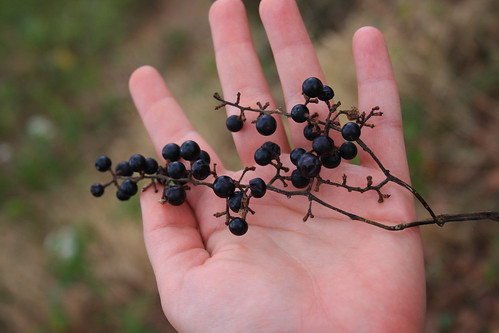
Vitis vulpina, delicious native Kentucky grape.
(*photo credit)
October 16, 2023 Observing World Food Day: Help End Hunger
After being satisfied with ample meals today, readers take on the unpleasant task of considering global hunger on World Food Day. Most of us await the next meal with slight pangs in the stomach, and then wonder about those who do not know with near certainty from where the next meal will come. Perhaps a billion can pray with earnestness, "Give us this day our daily bread." In a real sense we are called on to be God's helpers in redistributing to the hungry from the Earth's bounty. We are to be part of the solution to world hunger through local actions, through pressure for national leadership from a land of bounty, and to consider ways that the global community can improve the food situation. Recall that redistributed wasted food could amply feed the world’s hungry.
Local actions:
* Encourage the growing of food with all space that is available;
* Promote community gardens in areas where space is limited and people desire larger garden plots;
* Initiate and support farmers' markets and speak up in favor of locally grown food;
* See that "meals on wheels" are available in communities of need and that surplus cooked food be redistributed; and
* Act as an outlet for food to those in need through church and other non-profit organizations.
National actions:
* Arrange balanced nutrition in school breakfast and lunch programs so that all children receive healthy meals and are more able to study and learn properly;
* Expand summer alternative meals programs for needy kids;
* Lobby for international support of infrastructure development (access roads and storage facilities) in emerging nations, for small farmers to bring produce to market; and
* Expose climate change effects on food production and make every effort to move to a renewable energy economy both nationally and beyond.
Global actions:
* Pressure international groups and relief agencies to have UN-sponsored food surplus depots at strategic locations within food insecure regions, especially in Africa;
* Champion grain seed development and use that are custom- engineered for specific regional conditions such as drought- and flood-resistance (the Second Green Revolution);
* Champion the beneficial cuisine of various cultures;
* Combat the emergence of commercial junk food in other parts of the world through insistence on nutritional education programs and the curbing of misrepresentation by corporations; and
* Support relief agencies in efforts to meet needs during weather-related emergencies and in areas of civil strife.
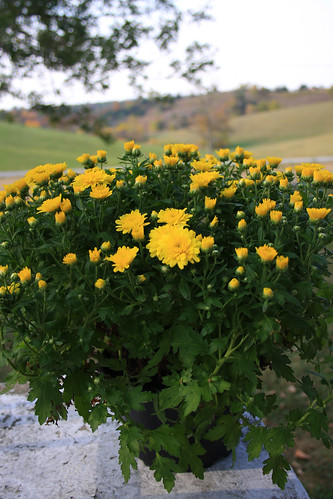
A bouquet of autumn mums.
(*photo credit)
October 17, 2023 Celebrating Peace and Justice Week
This observance brings together the natural alliance of the virtues of peace and justice. Pope Paul VI said if we want peace work for justice, which is the foundation for lasting peace. In times of conflict, we are tempted to think that resolving the immediate battle will bring peace and so divert focus from a longer-term solution to immediate concerns. The truth is that justice issues cover every field, and the sources of the many struggles in our troubled world involve areas of injustice. How much do difficulties in Pakistan, daily suicide bombings in Iraq, deadly civil war in Syria, or the terrorism in northeast Nigeria have to do with basic justice?
Diplomacy may work in nuclear discussions in Iran or in the religious disputes in Northern Ireland, or just perhaps in solving the ongoing Palestine/Israel struggle. Some of the African conflicts could most likely be resolved through diplomacy, but not all of them by any means. So could the emerging conflicts over territories and resource use by East Asian nations in the South China Sea. Political action to strengthen the United Nations and regional groups such as the Organization of African States are a springboard to solving crisis situations in Central African Republic, South Sudan, and the entire Ukraine.
Economic justice must be established in all parts of the world to reduce inequality and to stop the indebtedness that saps the extra resources of so many of the unfortunate poor. Much could be done through transparency in finding and taxing the tax haven seekers who hide assets from the coffers of dependent governments. If the unknown amounts of about $20-30 trillion were liberated by aggressive governments working together, a vast improvement of needed global structure could occur (e.g., American port facilities, service roads in Africa for farm produce, compost toilets for India). Consider how such available funds properly spent could improve the un- or under employment problems in our world. Thomas Picketty's wealth tax discussed in Capital in the Twenty-First Century deserves a hearing and possible adoption.
Prayers are needed for the courage by leaders to make the radical socio-economic changes that are necessary. We must be willing to work together as brothers and sisters within a stable world family. We must confront the false competitiveness that undercuts respect and replace this by a non-profit motivation that has many benefits associated for global communal welfare. Universalize non-profit motivation is at the heart of our plea, that people will be moved to love others and see value for all in so doing, for then true security can be obtained. We cannot continue the system of rampant capitalism, for it finds its god in money and in those who aspire to more and more through an insatiable appetite for mammon. We need both peace and justice.

Fresh pawpaw pie, harvested from Kentucky farm.
(*photo credit)
October 18, 2023 Creating Arguments for a Greener Diet
During the week of World Food Day, the call for a greener diet and its benefits demands added attention. The struggle is not merely over quantity of food, but the nutritious quality of what our brothers and sisters throughout the world receive. Too often people focus on personal greener diets and fail to see the social benefits of collective greening of diets, whether through food choices in schools and restaurants, removal of harmful commercial ingredients at the market place, or accessibility to higher quality food to the vast numbers of people.
The Center for Science in the Public Interest (CSPI) has strived to improve choices since we founded it in 1971 at the infancy of the environmental and consumer movements. It has continued through food and nutritional issues, with its Nutrition Action and Nutrition Action Healthletter, both receiving national recognition. One book published a few years ago by CSPI was Six Arguments for a Greener Diet and some of these ways are worth considering. Visit their website <cspinet.org>. Greener diet arguments include:
* Less chronic disease and better overall health. Consumers have problems falling prey to dangerous excesses of sugar-loaded junk food. But forms of restriction and regulated better diets benefit all and not just those who first value green diets;
* By greening our way of obtaining food through local community and backyard gardens we can build a homegrown menu of quality and not be prey to untested commercial products that can result in illness;
* Greener diets include organic foods that demand less harmful commercial pesticides and this can mean less contamination of soils where foods are grown;
* Overuse of commercial fertilizers in mass food production can contaminant the water; this can lead to lower quality drinking water and algae blooms on public water bodies. Green diets overcome this dependence on mass-produced materials.
* Producing a green diet of local materials curbs transportation and commercial corporate fuel expenditures and thus reduces climate change factors. Commercial livestock operations generate sizeable amounts of methane that have highly potent greenhouse gas (GHG) products. Likewise, manufacture of commercial fertilizers leads to additional GHGs.
* A green diet of less meat and animal products leads to less turmoil for commercial livestock and thus is beneficial to animal as well as human wellbeing.
Eastern gray squirrel (Sciurus carolinensis) at birdfeeder as indigo bunting (Passerina cyanea) looks on.
(*Photo by Sally Ramsdell)
October 19, 2023 Observing Wildlife of the Month: The Squirrel
Autumn is squirrel season. In recent years we have observed a multitude of wildlife and one of these is the fidgety bushy tail. They certainly were plentiful in pre-pioneer days, but the gun reduced the numbers of these loveable creatures. Among my favorites are the flying squirrels, which seem to be evolving enough extra skin near the front appendages to allow for a floating action from tree to tree. For years my residence in woods was graced by their presence; their acrobatics were a sight to behold.
Some verbs taken from animals are pejorative (to hog, pig out, horse around, cat (about), rat (betray), skunk (defeat), goose, cow (make timid), get someone's goat (annoy), etc.; others have a more neutral sense: to duck, hawk, crow, snake, dog, and, yes, squirrel. This last means to store away, and generally indicates saving for a needed time period; we should think of squirreling as an essential operation, lest the beast not survive winter scarcity.
Really the squirrel is a rodent of the family Sciuridae and is best loved if observed from a distance. Proximity breeds contempt, especially in those whose attic or vent spaces have been invaded by squirrels. These little creatures have an uncanny way of stealing bird feed even with some of the best safeguards devised. At our nearby state park, the squirrels have learned some amazing acrobatics, namely to jump from a distance to a hanging bird feeder and invade the device for seeds.
Squirrels can appear innocent when they come begging for food. They sit on their hind legs and beg so longingly for a handout that one can hardly resist. My long-time friend, Art Purcell and his family, have befriended the squirrel population in North Los Angeles using peanuts in shells. The squirrels' ability to quickly dispatch with those shells is utterly amazing and there is no end to their appetite for more and more. I guess their nervous movements burn up plenty of energy. The squirrel's quick turns and movements, as though undecided as to where to go, actually make them vulnerable to becoming roadkill from speeding motorists.
I do not fault hungry people who hunt squirrels in the autumn when the varmints are fat in preparation for winter. My ire is directed to dove, rabbit, and -- yes -- squirrel hunters who regard the killing of these little birds and mammals as sport. Let the coyotes use their hunting skills and appetites to control the squirrel population, but let squirrels be here as long as they can stay around without being vulnerable to the sport gun. The presence of squirrels makes us realize the joy of wildlife and their need for our protection. Their presence also reminds us that winter is coming, that we need to store things for the icy season, and that storage requires skill and focused attention.

More asters in autumn glory.
(*photo credit)
October 20, 2023 Reflecting on Amazon Deforestation
The Amazon rainforest acts as the lungs of the world, a vast sea of green that helps balance the oxygen cycle of our planet -- and take up a sizeable portion of the carbon dioxide causing climate change. Attending the first UN Conference on the Environment in 1972, we heard from a Brazilian expert that keeping the Amazon forested was utterly necessary for the planet's health. Over decades this early warning was repeated by scientists and keen observers. However, pressure to supply food (especially soybeans and beef) to an increasingly hungry world was emerging. Internal Brazilian migrants saw the possibility of making a good living turning rainforest land into cropland and pasture. Nonetheless, Amazon soils were shallow and easily exhausted; new grassland was of a poorer grade than in other cattle-growing parts of Brazil, and so transfer of forest to agriculture was a long-term lose-lose situation. Every acre turned to agriculture meant that much less rainforest taking up carbon dioxide to make carbonaceous wood and reducing climate change.
Some facts about the Amazon are worth noting:
* The Amazon is the world’s single largest rainforest, 2.72 million square miles of which 1.5 million are in Brazil, the most deforesting nation of seven in which it is located;
* The Amazon is the most biodiverse region of the world and home to millions of species of plants and animals, the majority of which are yet to be reported;
* Deforestation is changing the natural carbonation process in the Amazon region and now more carbon is being emitted than absorbed. Recall that Brazil is not the only culprit, for cut-over rainforest is occurring in Indonesia and the Congo.
Amid all the awareness of how serious the deforestation effects are, still the process continues with the current Brazilian government. One of the early restrictions started in the mid-1990s to 2004, was the Brazilian Forest Code that called for anyone who deforested a single unit of land to put four units into forest reserve. Between 2005 and 2009 the government moved to better policing procedures and the banned areas increased from one-sixth to one-half of the Amazon Forest. All the while the rapid improvement of cattle breeding procedures led to growing more cattle on less grazing land in other parts of the country. Environmental efforts led to a boycott of soy products coming from deforested land -- and rates of deforestation fell dramatically. To this was added the federal government restricting low credit to county areas of the forest that had high rates of deforestation, and thus bringing local government into the restrictive procedures.
However, the ideals were not always adhered to. In fact, over the years of this century the differing governments have either championed or ignored these meaningful restrictions. Let’s hope for the betterment of Brazil and the Earth that they are now enforced.

Migrating monarch, Danaus plexippus, journey south.
(*photo credit)
October 21, 2023 Pausing before Calling Others Names
When I feed the poor, they call me a saint; when I ask why they
are poor, they call me a communist. Don Helder Camara
We may call someone a name that is condescending or even disparaging -- some slurs are resented and some obviously overlooked. We may call someone a "saint" and yet that may be a stretch of the imagination; or we may imprecisely say they are "charity itself," when they are a bunch of thieves who chiseled low-income workers out of a proper salary. "Blood of vipers,” “fox," "stubborn people" and other such terms are found in the New Testament and declared by the best of folks, sometimes Jesus himself. To give a properly designated name is not wrong in itself, but we should do so with care or risk being uncharitable. We regret name calling -- so care is needed in problem arenas.
Ethnic designations. Ethnic names abound. Some words are so racist (such as "nigger" or "spic") that we hesitate to even write them here; others can still cause a certain sting -- "dago" or "pollock;" still others such as "micks," "wasps" and "krauts" have now outgrown their sting and are only historic relics. One that is taken by some as neat, but is stinging to others of us is "hillbilly," "Okies," and "redneck." During World War II and the Korean War, a fading few of us recall newspaper headlines referring to "Nips," "Japs," "Gooks," "Huns" and so forth. Perhaps it is best to relegate such terms to history, and leave them behind.
Jesuit designates a member of the Society of Jesus, but the term originated as a slur; the English dictionary still lists "Jesuit" as a crafty schemer, cunning dissembler, or casuist. It took considerable searching on my part in writing The History of Jesuits of Kentucky to determine that an 18th century German, Christian Priber, who worked among the Cherokee Indians and was called by the British a "Jesuit," was actually given this name as a derogatory term, due to his ability to organize Native Americans. I wrote to the director of the Jesuit Historical Institute in Rome, Fr. Charles O'Neill; he recalled the name fondly from his own research days; academics called Priber a Jesuit and quoted one to another with authority -- though Priber was no Jesuit, nor even Catholic. Sloppy academic attribution gave him the term.
Verbs too: Verbs can be used as slurs. To "Jew someone down" is such a slur and yet the term has common usage in non-Jewish areas. To "gyp" or cheat is a colloquial term with a stereotypical application against the Romany people. History's long memory takes us back to fifth century A.D. barbaric invasions that "vandalized" a place. Most English speakers are unaware that Catholics still become disturbed by the pejorative meanings associated with "to be dogmatic," "to pontificate" and "hocus pocus" (meaning magic but referring to "Hoc est Corpus Meum," the Eucharistic consecration).

Jefferson salamander, Ambystoma jeffersonianum.
(*photo credit)
October 22, 2023 Rendering Civic Duties; Respecting Government
Very well, give back to Caesar what belongs to Caesar –
and to God what belongs to God. (Matthew 22:21)
In today's Gospel passage the Pharisees attempt to trip up Jesus by asking him if it is lawful to pay taxes to Caesar. Jesus sees through their hypocrisy and asks for a coin (the Roman coin has a head of a false god and that was why observant Jews got the money changed at the temple into temple coins. The hatred of the oppressive government was evident in the questioning, but the readiness to produce the coin allowed Jesus to expose their hypocrisy all the more. Jesus does not choose one or the other choices laid down, but tells us we are to render respect to all parties where they are due. Handling affairs of the world must be undertaken with a sense of responsibility, even paying taxes when we may not favor a particular government's leadership.
Now fast forward to today. We approach election time in which all of us as citizens are expected to exercise our civic duties, not only attending religious duties on Sundays but also civic responsibilities on Election Day. We are to participate in each arena where needed. Championing the necessity of government is not a form of partisanship except in a rather perverse manner of speaking. In fact, all those who disparage or disrespect government, at least at some periods are happy to have good roads, police order, safe drinking water, and a multitude of services supplied by governments from local through state and federal to the United Nations itself. Respecting government is practicing faith.
Nothing is perfect in our world including humanly-conceived governments, but their imperfections do not absolve us from respect and performing civic duty. This civic mandate in a democracy is especially important, since each citizen is expected to contribute to making governing agencies work better and protect the commons; then all can enjoy life, liberty, and the pursuit of happiness. Through civic vigilance we contribute to properly functioning government. If incompetent people take advantage of governmental positions, alert citizens must expose them and call for change. Cynics say it is only a choice of rotten eggs. We must take our duties of service to country seriously and have confidence in anticipated improvement to what is imperfect.
The need for government in a world of growing inequality and persistent efforts to demean our governmental guardians has never been greater. The inequality by the wealthy has the effect of damaging the efforts of the poor to rise to a better quality of life. Those who disparage the role of government in our lives only make the poor more vulnerable and often speak from a selfish stance of having plenty and being thoughtless and ungrateful as to where the plenty was derived.
Glory of Autumn Leaves
By Fr. Al Fritsch, SJ
It’s that time of year,the leaves are falling and transitioning to the time when trees take their rest. And at this time of finality, we must look closely and examine whythe foliage is moving from verdant greenness to the autumn colors of red, gold, and orange. Why do trees turn such amazing colors in the fall? From a purely chemical process point of view, as night length increases in the autumn, chlorophyll production slows down and then stops. The carotenoids and anthocyanin that are present in the leaf are then unmasked and show their colors.But this seasonal change also reflects a spiritual cycle at the very heart of life; the leafcolors are changing and the leaves are leaving. And as they do, let’s ponder the phenomenon carefully.
Each season has its beauty and winter, of course, has a design and beauty in the nakedness of the branchesas we see them. In spring we have the comingblossoms,and that brings on the freshness of new life.We find the greenness of the foliage comforting and something that we enjoy very much,but it comes to an end, signaling the start of autumn. Everything in life has its beginning and end,and this season acts like an exclamation point to that truth.
We can look at the characteristics of the seasonal landscape itself. Why that color is what it is, bright or dull,a full and vibrant palette or only a partial swan song of color, this seasonal spectacle is directly related to temperature and day length, starting in summer. Weather conditions play a vital role, with cool but not freezing nights, sunny days and ample rain acting as key ingredients for bright colors. For a brief period of time we have this precious period of color change, whose variation also depends on the types of trees. Red oak and sugar maples, for example, tend to develop deep red and orange leaves, while trees like birch, hickory and cherry have bright yellow and orange hues.
Some years are a lot more colorful, producingan incredibly beautiful landscape, other years not so much. But when it is outstanding, let’s make a great issue out of it. Let’s celebrate this sort of transient flourish in God’s creation, here so briefly andthen gone, and try to make the best of it. Gazing upon this glory wethank God for the beauty, and praise what is before us. It is a simple thing to do.The entire creation gives glory to God in its beauty and presence and we rightlyparticipate in this marvel.
Spend some time looking and loving the landscape, encouraging others to do the same. Of course it would be good for us to considerany immobile people, the ones who can’t easily get away on their own,and take them out and immerse them in some way in the colored landscape. It would be a great opportunity for us to share this great resource with others. All in all, let’s praise God for the glory of autumn foliage.

Brachycorythis lastii, saprophytic native wildflower of Zimbabwe.
(*Photo by B. Wursten, Creative Commons)
October 23, 2023 Learning from African Hopes and Fears
As a continent, Africa gives us great hopes and fears. On the hopeful side is a rising economy in a number of countries as stability overcomes graft and corruption and more nations share earnings with the people in great need for health, education, and infrastructure. The continent is now awash with cell phones and electronic devices, having bypassed the era of landed phones. The people have a sense that the future is theirs; their religious expressions are sincere and energetic. While the population expands, the people have an immense desire to secure the fruits of development. Ample land suitable for agricultural production is ready for proper development hopefully by local inhabitants. AIDS, in South Africa, is being brought under control and health benefits while slow are beginning to reach the people, especially in countries that suffered from the recent pandemic.
Fears certainly exist. Disease is untreated, unemployment is very high, infrastructure to bring produce to market is highly lacking. A band across Africa where the Moslem north is divided from the Christian and still pagan south involves frictions from Mali and Nigeria in the west, the Central Republic of the Congo, and on east to Sudan/South Sudan and Somalia and its neighbors such as Kenya. In the north the Arab spring has given way to frictions in Libya and Egypt. In fairness, some of the African tensions are more tribal than religious. We read that boatloads of immigrants fleeing the continent are finding it increasingly difficult to reach from northern Africa to the southern European coasts, with much associated suffering and drowning.
Peacekeeping forces are present but limited in settling deep-seated frictions. The Democratic Republic of the Congo has witnessed a lengthy war (civil and otherwise) that has claimed an estimated 4,000,000 lives or an average of 1,300 a day for years at a time -- with little press coverage. Leaving the arena of human misery one faces wildlife poaching problems, which if allowed to continue will render elephants extinct by 2050.
This continent in turmoil is partly at the mercy of a world with its heartless commercial practices: propensity to deal with corrupt leaders; unfair marketing practices; corporate fishing off the coasts; climate change that will affect Africa severely; and ill-placed foreign assistance. With greater attention, some of Africa's problems will be seen as global ones. The wealth of the continent needs to be shared with the residents. Nigeria, Libya and other lands with billions of dollars’ worth of oil and minerals must work towards greater equality. The music, dancing, and general happiness of a vibrant people must be transmitted to quality of life in a world of massive urbanization and movement of peoples. Amid fears, Africans smile, and we could learn the lesson that it is time to forget petty problems and radically share resources with people in Africa-- a continent with a future.
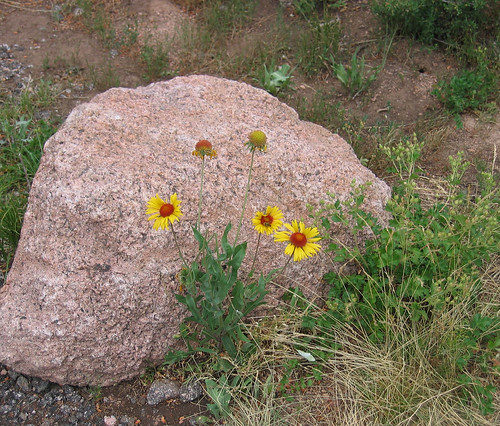
Western asters make for colorful surprise.
(*photo credit)
October 24, 2023 Focusing on Nuclear Power: Dead or Alive
One would expect that nuclear power would be too expensive and on the way to oblivion after the Fukushima, Japan tsunami disaster in 2011. But nuclear power with all its safety issues is far from being a dead horse, partly because the world is concerned about electricity produced by use of fossil fuels with resultant greenhouse gas (GHG) emissions. Then came the Ukrainian conflict with battle lines near large nuclear facilities. Though some of the processed uranium destined for nuclear facilities, along with concrete and building materials, were produced from fossil fuel-powered sources, still electricity produced does not have GHGs like coal-fired plants. Nuclear power remains a rising phoenix.
But does the effort to counter climate change absolve nuclear power? A number of western European nations (Germany, Sweden, and Belgium) are phasing out nuclear power with renewables attempting to fill the gap. The UK is experiencing a drop in nuclear power that is only a small fraction today. In America the rise of both fracked natural gas as a coal substitute and of renewable energy (principally wind and solar but also geothermal and other sources) is causing nuclear to start to fall in total electricity production as more and more nuclear plants are phased out of production. Some nations still see nuclear power as promising.
Promises of more manageable and lower-priced nuclear power facilities are slow in materializing for mounting costs of construction, unsolved waste disposal, safety of workers and nearby inhabitants, potential human-made disasters, and growing resistance by local residents. These all add to continued distrust and mounting opposition to new nuclear power facilities. Even France, a proponent of nuclear power, has second thoughts both with waste disposal problems and long-term health effects on people near nuclear test sites in French Polynesia (rising leukemia rates). Three and half years after the Fukushima disaster some 48% of children residing near the plant suffered from precancerous thyroid abnormalities and with 120 childhood cancers, when the normal number would have been 3.
Environmentalists show that nuclear power today only contributes a small fraction of the total global energy picture (about 3% and holding steady), when one includes the contribution of wood/charcoal for home cooking. Only one new nuclear power plant is coming on-line in the next few years in America while the new demands are being adequately filled by cheaper forms of fuel. In fact, energy experts know that phasing out both fossil fuel AND nuclear power could with effort be compensated by renewable energy replacement along with energy conservation practices. Even the ready source of low-priced uranium oxide from decommissioned military weapons is not sufficient. Tell Iran once more that peacetime nukes are enticements for global weapons' proliferation. Better yet, please tell the world.
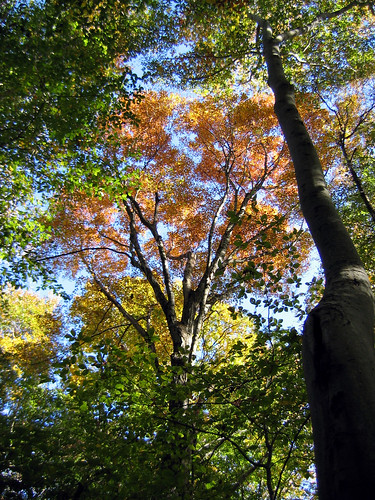
Autumn color in the Red River Gorge.
(*photo credit)
October 25, 2023 Standardizing English as a Global Language
This issue is not meant to sound triumphal, but rather to overcome and compensate for the unfair advantage of being native English speakers in a world seeking to speak basic English. Yes, ours is emerging as the world's lingua franca (in Italian, literally meaning Frankish language); this actually refers to a basic language that incorporates words from a variety of languages and used by commercial and traveling groups. The Internet has enhanced major languages at the expense of local tongues and dialects -- its own problem as minor languages are threatened. English is flexible enough, being a composite language of Germanic and Latin/French words. English is the most popular second language and is used by twice the 400 million primary speakers. Chinese (the world's most spoken language) is emerging as a co-lingua franca. One-quarter of Chinese are learning English.
About two decades ago when German ex-chancellor Gerhard Schroeder left office he went to Wales for an intensive course in conversational English, for he said he needed English as an international lawyer. Others sense the need for English to fly airplanes, navigate oceans, communicate over Internet, sell or buy consumer goods, do scientific research, and engage in a host of global-related activities. This accelerates the great demand for qualified English teachers to come to China or emerging lands and participate in English training. Learning language early is better, for youngsters' ears and tongues are more attuned and loosed for tricky "th" English sounds.
Teaching another a language is a professional undertaking and requires its own training, and so our American resources ought to be directed accordingly. Second languages for all. The great advantage of native English speakers is not needing the extra resources for learning it as another language -- though we could profit by knowing second languages (especially UN official ones -- Spanish, French, Russian, Chinese, and Arabic -- or perhaps German, Japanese, Portuguese, Hindu, or Italian). American schools should emphasize foreign language training; with a surging Hispanic population this could be helpful in coming decades.
It would be wise to promote "Globish" (See May 29, 2014 Daily Reflections) or the Globish Word List (on this Website). This could be coupled with another sort of standardization of English spelling, whether in a soft manner ("tho" instead of though or "nite" instead of night), or as some suggest a major change of all English word spellings to a standardized form currently unfamiliar to regular English speakers. Dictating primary language change is difficult, but establishing a Standard English Globish vocabulary is easier. This makes it polite for native English speakers to speak only such standardized words in global communications -- though this is a challenge for us to institute when Daily Reflections goes out to over 125 countries.
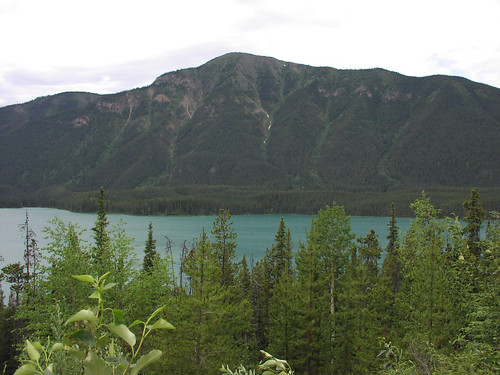
Muncho Lake, British Columbia.
(*photo credit)
October 26, 2023 Stopping Corporate Welfare
The title is not a new theme though recent progressives voted this to be the three-word bumper sticker they liked best. My good friend Ralph Nader used this same battle cry back in the 1990s in an address at Haverford College and then in an Earth Island Journal article "It's time to End Corporate Welfare as We Know It" in 1996. It has recently appeared in the Third World Traveler and to obtain the full Nader text go to that website. Today, Senator Elizabeth Warren and others are bringing this demand to stop corporate welfare to the full attention of the citizenry, for this has become a major part of the inequality issue facing our world.
One of the propaganda myths believed by a major group of otherwise well-informed people is that welfare is mostly directed to the lower quarter of the population. What is not known is that the major welfare recipients are at the UPPER quarter of the population in the halls of corporations and the higher ranks who profit from this somewhat hidden largesse on the part of the general public. Let's be honest: corporate welfare far exceeds that which is given to the rank-and-file people -- and examples of welfare cheats exist, but not at the magnitude as the welfare that lobbyists and pressure groups exert for benefit to corporations. Of the four quarters of income recipients in the U.S. the greatest governmental support is to the highest quarter, not the lowest as some would believe through food stamps and health benefits.
Corporate welfare takes many forms: inflated government contracts and subsidies; direct business grants; federal tax credits and benefits; state and local support in tax loopholes and benefits as incentives to attract organizations; failure to pay environmental damages and protection; and trade benefits both domestically and in foreign countries; and lower investment taxes compared to average tax payers. On top of this, businesses receive a host of write-offs related to sponsorships and promotion. But what corporation ever received a notice like small welfare folks, "two years and you are out." Their welfare is rather incentives that seem to go on and on.
Corporate welfare is difficult to halt because the hiring institutions easily persuades workers who have limited income that their jobs (though not any benefits that go to distant investors) depend on the welfare payments; these are sponsored by various tolerant and highly influenced governments. Thus, with both benefactors and the job-dependent workers, corporations become powerful lobbies that small businesses or independent operators are unable to match. Corporations can take advantage of the bidding wars among states with winners offered tax "relief" for years and at low rates, as well as property and transportation perks. For them, the successful region is the one granting the most giveaways at taxpayer expense. This all must cease.

October sunset along the Natchez Trace.
(*photo credit)
October 27, 2023 Forecasting Weather and Signs of the Times
What is the weather going to be like today? This weekend? Weather predicting is not an exact science. When young, we followed the lead of our parents and learned quite early to know the weather by going outside, looking at the sky and sensing the breeze, humidity, and scent of the air. A judgment based on the combination of elements was generally right, except we could not predict if that thunder shower would fall on us or on a neighboring part of the county. This was of utter importance when coming to hay-making. Today we depend more on a morning TV or radio weather report -- but I often suspect predicted immediate accuracy from a distance; only the general forecast where data from satellites and computers can help longer-range predictions.
The jingle goes something like this under a variety of forms:
Red in the morning, sailors' warning;
Red in the evening, sailors' greeting.
or
Red sky at night, sailors' delight.
(How can you see any color at night?).
The explanation is key to accurate rain prediction for we observe the red color as a reflection of light amid certain cloud formations. The high pressure has passed in the morning and thus the redness, whereas it is the high-pressure indicator in the evening that generally means good weather is immediately ahead next day.
On a non-weather note, Christ reminds us that we observe the weather quite accurately by looking at the sky, and so we should observe the other signs of the times. As autumn moves into full gear and the end of the Church year is only a month away, we need to listen to the Lord and observe the signs of the times. Knowing what to look for is important in our journey of faith (not just when to bring raincoats). Let us know obstacles to our faith journey and realize the political and economic scene as well. I prefer not to take an alarmist approach by focusing on hurricane numbers, earthquake frequencies, and other natural or human-made disasters such as economic depressions or impending wars. The end may not be near, for only God knows the exact time. Weren’t the recent pandemic and the Ukrainian/Russian conflict bad enough?
Apocalyptical alarms have limited value and must be understood properly. However, people read them differently and may just continue what they are doing, right or wrong. The signs of the times are worth observing, but one worthwhile conclusion is to change our wayward individual practices. Certainly if signs show impending global health problems, we as a people should take note and confront the issues with proper resources. The global climate change alarm requires a prudent approach, for it comes not tomorrow but in the not-too-distant future. And calling immediate "fire" can only be yelled so many times to achieve effective results; otherwise, the alarm loses its potency.

First frost in Kentucky.
(*photo credit)
October 28, 2023 Considering Autumn Hiking Comfort and Choices
Hiking is meant for every season, but it has its seasonal styles. Spring hikes involve freshness and exuberance; summer, caution and endurance; winter, readiness and protective cover; and autumn hikes are filled with wonder and excitement about the anticipated. By late October, it is difficult to determine how many of the leaves will be remaining on a certain day, whether the mist will clear by mid-morning, if it is going to rain, and so forth. We might expect about anything in October, for I remember snow flurries once on this very day a few years back.
Hiking in any season requires the proper equipment as was noted elsewhere for winter, spring and summer. When physical limitation curbs our aging ambitions during the changing seasons, we bring back memories of the many hikes, which proved so charming. A key to autumn selection is the most advantageous day for enjoying the autumn colors -- and the best routes for observation.
For autumn, we might think a little more about clothing worn than we did in spring and summer. This is not to suggest specific top-of-the-line miracle fabrics which are highly touted in catalogs, come with awesome test results, and more awesome prices. Quite a few of these new materials do wick well and can keep the comfort levels high for hikers. However, older and less expensive garments or cast offs may do just as well – especially, if you take pains to select pleasant weather outings.
Layers are advantageous for any outdoor activity when the weather changes -- but some, like rock-climbers and joggers, want to be less encumbered. Layers permit peeling off or adding on when the temperature changes as the day progresses. Here knapsacks come in handy for carrying along needed items. Wool sweaters work well for protection in autumn early hours provided they do not get wet. Thus, a combination of sweater and an outer water-repellant light-weight "shell" is just right for fall and early winter (vinyl raincoats are way too hot).
Ideally the shell should be tough, allow body moisture to vent, hooded, adjustable at mid-section, and equipped with pockets for storing things. Intermediate synthetics are not to be omitted simply to stay "green" by using natural fibers. They may be longer lasting; they are good at insulation and light weight, and can easily be compacted into the knapsack. Innermost levels may give some hikers the most trouble, for cotton and silk get damp. Some experts suggest polypropylene and polyester materials but much depends on just how much activity you intend. It pays to experiment with products. Remember that day hikes are not nearly as demanding as longer-term hikes; if you hike the Appalachian Trail or Pacific Crest Trail, take advice from previous hikers. For whatever type of hike, make an opportunity to enjoy the autumn, even after the leaves fall. Just don't underdress. I wish I had the wherewithal to follow these hints.

Wayne Davis's Kentucky Bluebird Box.
(*photo credit)
October 29, 2023 Loving God and Our Neighbor
Lord your God with all your heart, with all your soul, and with all your
mind. You must love your neighbor as yourself. (Matt.22: 37, 40)
How do we love God with our whole being? This is a persistent question that we hesitate to try to answer. Our wholeness is tested when we admit we do not know how to love perfectly. Jesus ties our love of the God we do not see to our neighbor who steps on our toes at times. Our test to wholehearted love of God then is related to being a Good Samaritan to those who are in immediate need. When we fail to love others, this is an indicator that we are not prepared to give everything to loving God. Openness to neighbor becomes our measure of love.
Improving our practice of love is a challenge. Love is not a wealthy supply of goods that we carry around in a backpack. Yes, God records our loving deeds, for we are not burdened to be our own accountant, though we ought to observe our neighborly practices. We do record how we treat our sisters and brothers in everyday life and even grow in that improvement, all so we can love God with all our being. Thus, improving neighborly practice makes us more open to God's love. This is more than uttered loving words; it involves the continued commitment of good will, prayers, blessings, and kind deeds that we continually perform and improve over a lifetime. Practice becomes our road map of our journey of faith, a road map involving a longing to come to the seat of Love, the Alpha and Omega. God bestows love; we do not make it. God bestows more love on an open heart which we can open.
When younger, we considered this giving of our totality as imperfect and it was. With maturity, we accept our limitations and simply say we cannot do it ourselves. Only with God's help we discover that in our acknowledged powerlessness we find the power to go beyond ourselves, for God is with us. In the quest for love we find that God can do great things if we but have faith that power can work through us -- not by us. In a quest for love we become truly active, for the activity while arising within us is not because of us. The Spirit is at work within us, enabling us to act and to continue on our journey of faith. Amid it all with humble hearts we hope the ultimate quest will be achieved. Opening to God and neighbor allows Divine Love to engulf us.
God is the author of our love and, in gratitude we begin to see that even the gratitude itself is God's gift, if we are but open to receive it. Our acknowledgement of powerlessness is our entry into the power of Divine Love -- and this acknowledgement comes in our openness to the needs of our brothers and sisters wherever they are. Others become part of our love that transforms us into a loving community. Love is not just between me and God, but through openness to neighbor it becomes a loving us, working together to help establish the fullness of God's kingdom.
Revolution
By Fr. Al Fritsch, SJ
Revolution is an essential part of the world in which we live. We are sons and daughters of the American, the Industrial, the Information Revolutions, and many others that have occurred over time. There is a revolutionary spirit within us, and perhaps it is justified. That means change is necessary and that we must do something about it if we can. Let’s examine the different reasons why a more or less normal person may awaken to a revolutionary spirit. How can we improve this life?
First, understand that history in general demands that an unsustainable system leading to inequality, destruction and even extinction, must be replaced. People who feel this imbalance and disorder are driven to take action. This extends to individuals who suffer from poverty, and that brings us to the excessive wealth that exists today - it breaks down the dignity of human beings. We see this when rich people do anything they want, buy leaders and support and call it a democracy; their power comes from their wealth. Poor people have suffered very much and therefore see the difference, see that they never get to where they can exercise their democracy in full, and this is inherently demeaning. We must through fair taxes and other means bring down that excess and distribute it to the people.
Silence on our part is destructive when we fail to speak and act. For individuals to allow this to occur and democracy to be damaged through this excessive wealth is unfathomable. There are things we ought to be doing which we are not, and this adds to our powerlessness and frustration, but at least we should think about it. We must recall that the spirit constantly moves us to act, and therefore our power is given to us by the Lord - this is true power.
A public interest motivation is every citizen’s responsibility, to make sure that the rich are not overly rich and the poor have enough to live on and the essentials of life. Change will depend on how we approach this process, but we must move in that direction. Continued tolerance of excessive wealth is a form of violence. We should see it is not right that some people have too much and others do not have enough even to decently live, for the essentials of food, clothing, and housing. This suffering and violence is being caused by the wealth imbalance of the world.
Merely tweaking an unsustainable system is not sufficient in itself, and we must come to understand that as a just people we’ve got to do more. That’s why revolution for change must be profound, and it means reclaiming the Commons for the vitality of our very planet. The Commons are for all people, not just a few, and therefore the redistribution is a massive undertaking that we all are called to do.
Remember that Pope Francis said A Christian who is not a revolutionary today is not a Christian. We are called to be revolutionaries in the fullest sense. What actions should we take? Well, we can individually and as groups try to bring about social changes such as a renewable energy economy, allowing for more equality as it comes. We can talk about community gardens and greening our cities. We should encourage worker-owned cooperatives and support more comprehensive public rail systems, and on and on. Many different actions can be taken that people will find helpful in nurturing this process.
The revolution can occur in a wide sense, as with the Chinese Revolution; I sat in class when the teacher said you will not in your lifetime see such change as this. That was 1946 and 73 years later we still haven’t seen any major change in our life. At the same time there was another type of revolution going on with information, and the Internet has changed us all in many good and bad ways. Small changes occur constantly; I can still remember seeing ballpoint pens for the first time in the 7th grade and oh my goodness, the whole messiness of fountain pens was gone. I can remember when tractors took the place of horses and we had to earn more money to pay for the fuel. These changes were occurring, a revolution, before our very eyes - it has done so and it will continue to do so. Let’s consider where we fit in, and the importance for us to see ourselves as part of the system of the revolutionary spirit.
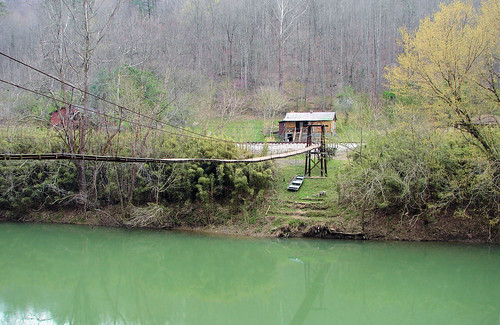
Perry Co., KY swinging bridge.
(*Photo by C.C. Selgle, Creative Commons)
October 30, 2023 Walking over a Swinging Bridge
Swinging bridges are like sorghum mills, porches, and covered bridges; they are part of vintage Appalachia. They challenge some, are needed by others, and are picturesque to virtually all.
Challenge. I observed some visitors walking across the swinging bridge that has been built on a trail in Kentucky's Natural Bridge State Park. The kids scampered across and even rocked the bridge a little as best they could. One robust parent gingerly followed across keeping up with the family and yet a little nervous. Though that bridge is no major challenge, it did bring to mind another sort of swinging bridge, a "Burma Bridge" in British Columbia that had only two hand cables and one foot cable and swung over a wide, rushing stream. At the midpoint I thought the foot cable was moving downstream and the stream was standing still. What a fright! But have courage; the Appalachian swinging bridges are four cable affairs with planking connected to the two lower cables.
Necessity. People put up swinging bridges in the days before adequate road systems, because they were either short cuts to getting home or they were high water substitutes for normally shallow fords or river crossings on ordinary wagon roads. Recall Appalachia's narrow valleys and large upstream drainage areas are prone to extraordinary high water or flooding. In a matter of an hour or so a placid small stream becomes a raging river and spreads over much territory. That is why swinging bridges seem so lengthy in dry times. Of course, these bridges are for humans and those pets willing to cross, but not for queasy horses.
Picturesque. Swinging bridges are works of art requiring attention to basic bridge engineering as to location, choice of materials, and anchoring posts and cables. They draw on skilled local workmanship to stretch cables and insert and firmly attach plank flooring. When well-placed they are graceful with cable arches beautifying otherwise squalid valleys over creeks and among leafy shore vegetation. The swinging bridge is worthy of contact through direct experience or by a recorded picture, painting, or a mental reflection. We fantasize as to how much of a challenge they were to robust elders bearing parcels and sacks of food and feed, and how youngsters would scare them a little by shaking the bridge. Maybe the bridge elicited a curse in the middle, a turned stomach, and then a "thank God" at the end.
Many swinging bridges stand in mute testimony to simple lives of the past before the advent of substantial road bridges. Today the planking is sometimes rotted, and so the temptation is to ignore the "do not cross" signs that frequently appear. Swinging bridges are like relics out of the past reminding us that life was once harder, and we whisper a prayer for builders and crossers.

Abandoned rustic cabin. Pulaski Co., KY.
(*photo credit)
October 31, 2023 Reconsidering Halloween
I don't delight in being a mean ole Scrooge on Halloween and demean this day. But there is genuine ambivalence among religious families and secular groups as to how to make this a kid's day, and yet avoid the scary Pagan witches and goblins and the tricks and junky sugar treats. In rural America and perhaps in urban areas as well, this seems to be a night of older youth participating in forms of vandalism that has little resemblance to the original celebration or a reasonable interpretation of "trick or treat." My more gracious side says let this be a special holiday for kids. Yes, winter is Earth's less active period and we need to celebrate before it comes. We don't taunt people when they need rest, so why taunt our Earth? But if youth's excess energy must be rerouted, let's redirect Halloween to better goals.
Modified trick or treat. I think families have a challenge in what to do with young tots on or near Halloween when others are engaged in what some might term odd-ball practices. I concede, for the very small tots under six, take them to a few neighbors alerted in some way beforehand for a trick-or-treat tradition -- not to total strangers' places. Do it before dark and keep this for younger folks and not middle school ones. Subtly suggest that the gifts ought to be wholesome foods (fruit, nuts, etc.) but not junk food. Is this asking too much from the candy makers?
Travel movies. Movies of a comical sort could be the menu for the older youth or even supervised parties. Maybe it is the time for good travelogues, even if you must splurge and take them to a wide screen showing of one or other places (the Asian Himalayas, the African Kalahari, or the isles of Oceania).
Party as a community celebration. The notion that being scared out of one's wits is fun is somewhat misleading. Many hate the events but dare not tell peers for fear of being harangued. It is as though on this evening mutual social blackmail is being committed on many too hesitant to show displeasure. So, create a party atmosphere that will allow for wholesome fun and entertainment. Even though computer games are the rage, old party games can be salvaged and reused to everyone's delight. It’s a time for hayrides or their equivalent.
Do some social service. What could be the talk of the town is to do something for the uplifting of old folks at a senior citizen or rehabilitation facility. Local youth serenading those who get very few visitors in the course of this week can be uplifting -- and rewarding for all parties.

